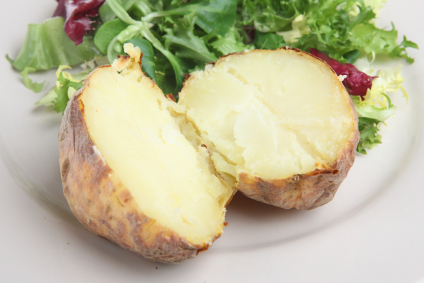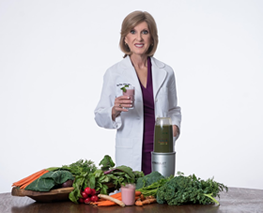Should People with Diabetes Avoid Potatoes?
Should people with diabetes avoid potatoes? Myths about foods people with diabetes should eat or not eat are numerous. Potatoes are one of these foods that have gotten a very bad wrap, and because potatoes are known to be a “starchy” vegetable (and break down into sugar), it is believed by many misinformed people that they should be completely avoided in those people having diabetes. This couldn’t be further from the truth! Please, allow me to bust this myth and properly answer the question: “Should People with Diabetes Avoid Potatoes?”
First of all, let me present the facts about potatoes:
The White Potato
- The potato is fat-free, cholesterol-free, high in vitamin C, and high in potassium, and a good source of vitamin B6 and dietary fiber.
- An average 5.3 oz potato with the skin contains 45% of the daily value for vitamin C, 620 mg potassium (comparable to bananas, spinach and broccoli), trace amounts of thiamin, riboflavin, folate, magnesium, phosphorous, iron and zinc. This nutrient power-house contains only 110 calories, no fat or cholesterol, 116 mg of sodium, 24 grams of carbohydrate, 2 grams of fiber and 3 grams of protein.
- When white potatoes are boiled and cooled to room temperature, they form a resistant starch. This resistant starch feeds the good bacteria, which are responsible for butyrate production. Butyrate is crucial because it is the prime energy source of our colonic cells. Resistant starch also improves insulin sensitivity and improves the integrity and function of the gut. For more about keeping your gut healthy, go here.
- A ½ cup serving of potatoes is considered one carbohydrate choice (15 grams) in the diabetes meal-planning world. Think of a “computer-mouse” as one-serving size of a whole baked potato (1/4 of a large potato). Restaurants enjoy serving you potatoes the size of your “shoe.” Be sure to only eat about 1/4 of what is served at a restaurant!
- So, what do you think so far? Should People with Diabetes Avoid Potatoes?
The Sweet Potato
- The sweet potato is rich in beta-carotene (a form of vitamin A). The body converts the beta-carotene in one serving of sweet potatoes to more than twice the daily requirement of vitamin A.
- Beta-carotene is a powerful cancer fighter that also reduces blood cholesterol.
- In plants, beta-carotene serves to protect leaves and stems from the ravages of sunlight and other environmental threats. In humans, these same compounds help block cancer formation, and also protect against arthritis and other degenerative diseases.
- Sweet potatoes provide nearly as much vitamin E as do fatty nuts and seeds, and provide a nice dose of vitamin C and iron.
- An average 5.3 oz baked sweet potato with the skin contains 135 calories, no fat or cholesterol, 54 mg of sodium, 5 grams of fiber and 3 grams of protein.
- A ½ cup serving of sweet potatoes is considered one carbohydrate choice (15 grams) in the diabetes meal-planning world.
- So, what do you think so far? Should People with Diabetes Avoid Potatoes?
The Purple Potato
- Haven’t heard about purple potatoes? I know, they are hard to find in most grocery stores. When you do find them, I definitely recommend you try them. The are amazing!
- Purple potatoes are very similar in nutritional value to the Russet potato, but instead they have 4 times as much antioxidants.
- The extra antioxidants in purple potatoes make them even better than Russet potatoes for helping to regulate blood pressure, due to their high potassium content. They are also lower on the glycemic scale, therefore, blood sugar regulation is significantly better!
- Check out my separate blog post on the purple potato here and also get a great recipe idea!
- So, what do you think so far? Should People with Diabetes Avoid Potatoes?
With the amazing quality nutrient content of white, sweet and purple potatoes, does this sound like food that should be avoided in people with diabetes or in anyone for that matter? Absolutely not! Potatoes are nutrient power-houses. They are complex carbohydrates that provide a sustained source of energy, which people with diabetes require just like everyone else. Plus they provide fuel for the good bacteria in our gut and no amount of words can explain the importance of a healthy gut for diabetes and for everyone. (Be sure to check out our “Comprehensive GI Stool Profile Package).
What Should Be Avoided in People with Diabetes?
What should be avoided in people with diabetes or in people who want to avoid becoming overweight or obese or developing diabetes, is excess amounts and excess ingredients added to the potatoes (especially if these ingredients are from processed foods and not organic). Potatoes only become unhealthy when they are eaten in too large of a quantity, are fried, or are bathed in other unhealthy foods like margarine, non-organic butter, cheeses and cream, or marshmallows.
How Can Potatoes Better Be Included in a Healthy Meal Plan for People with Diabetes?
Potatoes can easily fit into a diabetes meal plan, but the amount depends on your individual carbohydrate allowance. It’s very important that you consult with your healthcare provider and your registered dietitian to determine just what your individual carbohydrate requirements are at each meal or snack. Generally, a good rule of thumb is no more than 15 to 30 grams at a meal, but these are only estimates. Your needs will vary.
The amount of carbohydrates you eat will also depend on the other components of your meal. You may even consider extending a dish, such as creamed or mashed potatotes, with another great vegetable, steamed cauliflower. This will cut the carbohydrate content even more and allow you a greater serving without sacrificing taste. Try it—it is really delicious, as well as nutritious.
Like all foods eaten by people with diabetes, it’s important to see how individually you react to different foods and meals. It is desired that people with diabetes test their blood glucose with a glucometer once or twice a day. Two hours after a meal, it is desired that the blood glucose be less than 140 mg/dL. If it is greater than this, you should contact your healthcare provider and/or registered dietitian, to find out how you can get better glucose control through improved meal planning, increased activity, and/or adjustments in your diabetes medications.
However, saying that, don’t get too overly concerned if you see your blood sugar getting too high after eating a certain food. Remember, that an elevated blood sugar is a SYMPTOM, that is temporary. It’s great that you are monitoring your blood sugar, but take that information and use it to make necessary adjustments. For example, don’t give up eating potatoes occasionally, since they have so many other health benefits that can actually help you better manage your blood sugar, as described above.
What Else Can You Do to Prevent or Reduce the Rise in Blood Sugar after Eating Potatoes?
When you do eat potatoes, make sure you are eating them in combination with a good protein and healthy fat source to reduce the glycemic load. Also, keep the skin on. This provides fiber and also reduces the glycemic load. Like any other food, don’t eat them everyday. In addition, since potatoes are part of the “dirty dozen,” always purchase organic potatoes if you can, since pesticide residue can lead to inflammation (and elevated blood sugar).
Also, go for a walk after you eat a meal, containing potatoes (or any carbohydrate). This will also help blunt the rise in blood sugar. Another suggestion is to drink this beverage before eating a food that you know will raise your blood sugar. Try it…it really works. Remember, everyone’s blood sugar rises after eating potatoes. That’s just how it works!
So, to finally answer the question and put this myth to rest, “Should People with Diabetes Avoid Potatoes?” Simply put: NO!!!
If you want more information on how to manage your blood sugar, consider having micronutrient testing done. This may uncover other deficiencies that are leaving you with elevated blood sugars. All the diabetes medication in the world won’t fix this—in fact…diabetes medications may only be making things worse. We can also provide you with other recommendations to help naturally reduce your blood sugar.








